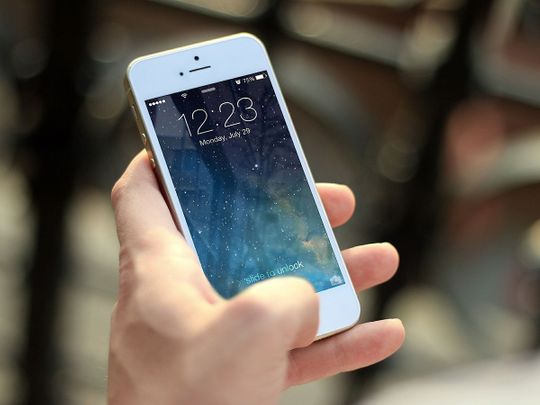
Manama: The imam was delivering the Friday sermon at a mosque in the Saudi capital Riyadh when he spotted a man sitting on the carpet and using his mobile.
“My dear! Using a mobile while listening to the sermon. This cannot be. Either the mobile or the sermon,” Adel Al Kalbani, a former imam at the Grand Mosque in Makkah, said.
“This is amazing, my brothers! The individual can no longer wait to use the WhatsApp or Twitter. Devote five or ten minutes to God and the sermon is over. God bless you,” he said in his famous soft voice.
The incident at the mosque in Riyadh was not a rare occurrence, and in fact, with the increased use of smartphones and tablets, prayers, sermons and religious services in mosques in many countries have had numerous unexpected interruptions.
“In the last few years, we have heard during prayers various types of mobile ring tones, from religious themes to Gulf songs, Lebanese serenades and Western pop music,” Sanad Abdullah, a regular Bahraini mosque goer, said.

“It is a shocking phenomenon that should not be allowed to continue because distractions from prayers or sermons, especially when they are brutal, are a source of nuisance and make worshippers lose their spiritual concentration.”
With spiraling advances in technology, uncountable advantages and outstanding services, mobiles have become increasingly popular and hold a position of choice in mosques.
Reading from the Quran on a smartphone was unknown a few years ago. Today, inside mosques, people are increasingly setting aside print copies of the Quran and resorting to mobile phones and tablets to read verses from the Holy Book as required from Muslims to keep them from talking about worldly affairs in the spiritual edifice.
“There is nothing wrong with reading from a cellular or a tablet and its is totally permissible. However, their misuse and excessive use are an issue of grave concern. People are free to choose their ringtone, be it a recitation of verses from the Quran, religious tunes, famous songs, baby laughs or any theme song, but they are not free to impose their ringtones on worshippers seeking tranquility and serenity in a mosque,” Sanad said.
While some people are instantly ashamed when they realise that the tunes or recitation disrupting the worshippers in the midst of their prayers were emanating from their mobile phones and quickly try to silence them, others believe that they should refrain from making any gesture and should wait for the mobile to fall silent, compounding the frustration and anger of those in the mosque.
Abdul Lateef Yousuf is from Kerala, with an ever-smiling face. However, the office boy who has lived in Bahrain for 23 years loses his smile and gets upset whenever the spiritual communication inside the mosque is disrupted by a crying child or a rude ringtone.
“Going to mosque is an indication of piety, but God has also made it clear that people while praying should devote their prayers to Him and that they should not be distracted by any commercial deals or distraction,” he said.
“Back home in Kerala in the mosques where I pray, all imams and worshippers make sure that the cellular mobiles are switched off or in some cases kept off the premises during prayers. It is great to have ring-free prayers. Unfortunately, not all people here respect such commitments,” he said.
With their multi-faceted communication, educational and recreational tools, mobiles have inexorably become an essential part of people’s lives, he added.
“However, people no matter how busy or engaged they are, can set aside some time to perform prayers with their mobiles switched off. It is a matter of ethical behaviour as well as commitment to the moral relationship with religion during the prayers,” Abdul Lateef said.
Some imams in Saudi Arabia reasoned they use technology to prayer-disrupting technological devices such as mobiles.
“We installed mobile jammers that were designed to block communication signals inside mosques to prevent the ringtones and disturbance caused by cellular phones while during prayers,” Radwan Al Radwan, an imam at Al Akhlas Mosque in the Red Sea city of Jeddah, said.
“However, following their installation, we had to take them down. An official circular banned the devices because of their risks in the first place on people suffering cardiovascular diseases with pacemakers in their bodies. It seems that mobile jammers do disrupt the functioning of these devices.”
Another imam in Jeddah added that the jammers were also abandoned after some people whose homes or offices or shops were near the mosques lost their Internet connections and complained.
The only option left is to increase awareness among worshippers and to urge them to switch them off or keep them in their cars or homes, especially that that their ringtones are a burden on the ears, Al Radwan said.
Many imams embrace the habit of telling worshippers as they form straight lines behind them to “stand upright and to straighten up” in preparation for the prayers.
“Now, we have imams who immediately before the prayer, tell the worshippers ‘Stand upright, straighten up and switch off your mobiles.’ It is not in keeping up with the centuries-old tradition, but it seems it has become a necessity since almost everyone now expects mobile ringtones to disrupt the prayers, and possibly a verbal or even physical fight may ensue,” Sanad said.
In December 2014, a video of worshippers quarrelling in a mosque in the Gulf following a standoff between two men over the ringing of a mobile ahead of the prayers, went viral on social media.











